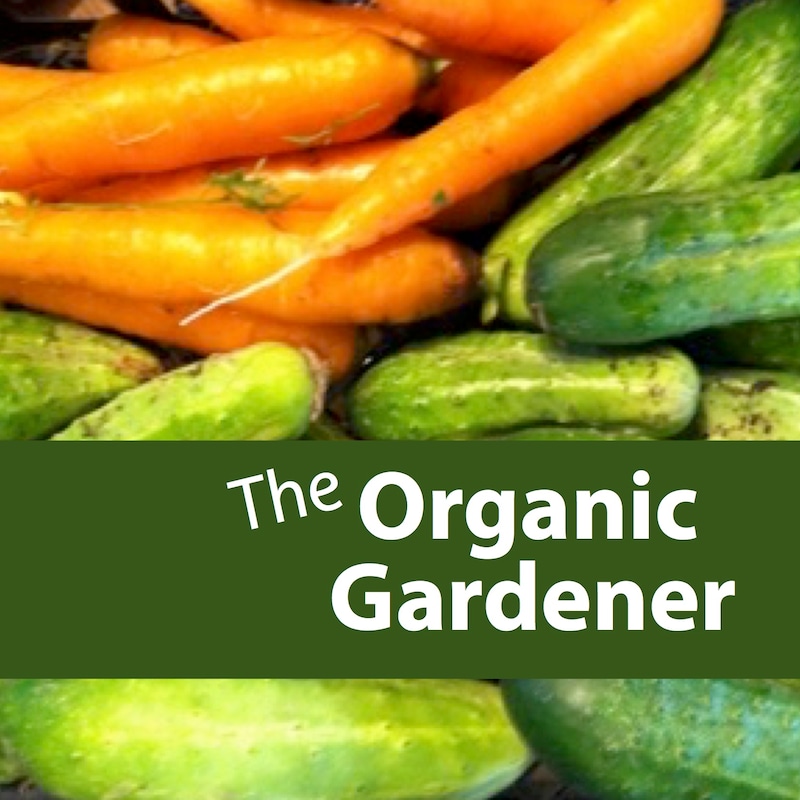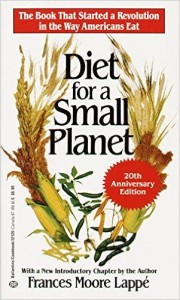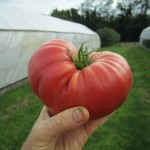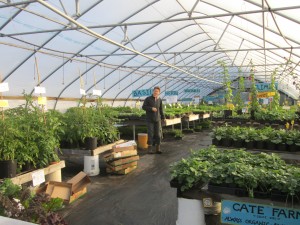
Shownotes
Since Ellen Polishuk and I talked about my interviews with Richard Wiswall and Julia Shanks last week I thought I’d replay them for listeners this week. Here’s the amazing Richard Wiswall.
Welcome to today’s episode of the Organic Gardener Podcast! I am thrilled to introduce my guest who has written an amazing book about the business of organic farming that I think will inspire listeners to think about the options for their future. His book starts out peaking interest with a quote from a talk a fellow farmer gave at the New England Vegetable and Fruit conference “Sometimes I think I should have listened to my parents and become a doctor or a lawyer, but you know, I don’t think I could take the pay cut.”
Eventually he would write the Organic Farmer’s Business Handbook: A Complete Guide to Managing Finances, Crops, and Staff – and Making a Profit. This book comes with a companion CD that included templets for creating worksheets, budgets including cash flow projections, and even payroll.
He’s manager of the Cate Farm a family owned and operated organic farm in Central Vermont that includes 22 acres and seven 100-foot long greenhouses of organic vegetables, medicinal herbs, and flowers. Everything they sell is certified organic.
Tell us a little about yourself.
So I’ve been farming full time for about 35 years now. Business has changed over the years, for the first 20 years, I was a highly diversified organic vegetable, herb and flower produce that sold to markets in Central Vermont and through Deep Root Organic Coop, which is a growers coop that sells to Boston and NY to bigger stores.
We had a CSA in the nineties, went to Farmer’s market for 25 years. As I get older I don’t want to work as long and hard as I used to so we no longer do the CSA or Market, even though I’m big fans of both of them.
The other thing I’ve been doing besides farming is to help other farmers trying to help tune up their businesses, because I’ve seen a lot of people after 9-10 years they’re struggle after making long hours, their burning out because the money is not there. I was helping others at conferences etc so I wrote the book because I saw things that came up over and over again that seem to be point needing to be addressed.
In short farmers love doing what they do for all the right reasons, being outside and watching plants grow, and nurturing them and producing delicious nutritious food, what could be better there’s a fundamental satisfaction from that.
I don’t think anybody gets into farming because they want to be a business person, and study business sheets and cash flow projections but ultimately the reality is farming is a business and you have to know the business end of it where you’re not gonna succeed. You can be as ecologically sustainable but if you aren’t economically sustainable that goes out the window because you wont be in business anymore.
I try to get people to spend a little time to work on their business not just in their business, and ask them to set aside 3 hours to do some long range thinking and planning and look at the business and also analyze where the money comes and goes so you can work fewer hours and make more money, ultimately that would be great that’s what a lot of people want.
I think a lot of farmers tend to over work themselves. Farmers can be guilty of self exploitation because they believe so strongly in what they do and it’s a great life but they can work longer and longer hours and sacrifice other parts of your life to make your farm succeed but that self-exploitation has a boundary as some point where you can’t do that as much anymore and you can’t keep going or you burn out. That’s where I’m coming from, that’s where I like to point people, if you are going to try to make a living farming or market gardening, pay attention to the business end.
I heard a guy say in a Facebook group the other day that you can’t make money farming unless you have big average and its a struggle. And certainly all of my podcasting friends talk about how if your podcast isn’t making money it’s a hobby and not a business you need to think about, know how much you want to follow your passions you have to be realist, and as an artist it’s the same lesson I need to learn there too. No matter how much you like to do what you like to do it there’s always that piece how are you gonna make money at it..
It’s interesting you bring up people say that’ it’s hard to do, I don’t want to sugar coat it, it’s true there’s a lot of barriers involved, farming is a hard way to make a living, but there’s that kind of nay-sayer attitude that is self-fulfilling and I’m not sure if it’s a genetic defect of farmers that tend to moan more then look on the bright side. I think what you hear in the farming community more people are complaining about things that can go wrong, whether its markets, pests, or disease or the tractor breakdown. You hear very little from the people who are successful and there’s a reason because people who are successful, don’t like to brag about their success. So you don’t hear from them.
Also if you say I can’t make a living farming, its an easy course to teach, well you just taught yourself, the more you think that then you can say you achieved your goal.
As opposed to I believe very strongly a good living can be made farming, you just have to think about it treat it more as a business then as something that will fall into your lap.
One thing has been a bit of a theme this year on the show, with things challenging even if one thing fails, the majority of things work. One thing might not work and you’ll learn something. Every year there’s gonna be something that fails but the majority of things grow.
Tell me about your first gardening experience?
My parents kept a garden all through my childhood and my first gardening experience was me and my brother was maybe 2 years older then me, I don’t think we were hired just we were asked to flip a new piece of ground. So we took some spades, hoeing it into shape, and it’s a very fond memories of the satisfaction in working in the earth. After that my parents had a garden we helped tend the garden.
My first solo garden was 19 working at a summer plot, there was a community garden, that’s the steep learning curve, you have to try putting peppers, what kind of peppers are you gonna grow, spacing, and cut worms what are you gonna do about cut worms? There’s all those things, that was a very positive thing. Plus the fact that all the neighbors and fellow employees were so willing to help share their knowledge about how to do things. I think that’s a positive part of the gardening community people are willing to help one another out working for everyone’s success, that’s a very positive thing.
It wasn’t till I came to Cate farm and tilled up an acre, we had someone custom till an acre we had a very diverse shotgun approach of what would do well, and what would sell well. The next year 2 acres- doubling to 4 acres and then … 6 acres, 8 acres… 12 acres. up to 16 acres, and so very quickly we went up to scale, then actually back down to about 12, because 12 highly diverse row crops was about all that I wanted to handle with the crew that I had.
As a kid I always grew up wanting to be a homesteader, me and my brother would go read Mother Earth News from issue one and totally into the self-sufficiency and independent living skills. I thought as a kid well I would be half-time farmer half-time professional but I became a full time farmer pretty quick. Luckily happily so.
You grew up in Vermont right?
No, I grew up on Long Island (NY) on south shore which was very agricultural I grew up with potato and cabbage farms surrounding me, even though my family weren’t farmers but I was surrounded by it. Since then it’s changed to more houses and woods. Long Island was a great place to grow up in the 50s and 60s. Then I moved to VT in college and have been here ever since.
I grew up on Long Island too and people are always surprised, Long Island has lots of nature preserves and cool farms on the Eastern end.
Once you get past the commuting line, half way out on the Eastern end it has lots of agriculture and almost has a New England feel and look to it.
What does organic gardening/earth friendly mean to you?
I think I was attracted to organic farming, besides reading all the Mother Earth News way back when. I went to school, during junior year went to Nepal, outside Katmandu valley, living in a mud hut and they raised water buffalo and we biked to school for language and culture classes and that was a pivotal part of life. I did an independent project on effects of green revolution. That started me thinking along the lines of wanting to run my own farm.
Helena Scott Nearing came to talk.
 Diet for a Small Planet and Radical Agriculture,
Diet for a Small Planet and Radical Agriculture,
Wendall Berry Unsettling of America kind of capped it all, but it was when my college advisor put me on a tractor one weekend to help him disc a field, when I realized what I wanted to be doing. That’s kind of how it started.
Organic Gardening is kind of living by a set of values, for me, being an organic farmer I like having a business compromising my values for having a healthy planet and producing nutritious food. To use natures cycles to produce a nutritious food without any undo impact or harmful impact. So for me it’s using as much that’s given to us, whether is’t sunlight, atmospheric nitrogen, carbon, very incredibly diverse microbial complex soil and inter-relationships that we can use to grow good food for people, plants and animals.
Organic gardening on a technical level we’re certified organic, so there’s a federal law that says what’s organic and what’s not. But on a general level it’s using those natural cycles and treating the soil with the most upmost respect so you are encouraging it, nutrient cycling as much s possible and treating the soil with respect. On a practical level we use a lot of cover crops. We have the ability because we have more acreage then we row crop that we can rotate things in and out of cover crops. We actually got a combine to grow grains as part of our rotations. If you grow cover crops, you are basically growing a crop that is resting the soil from row crops, as well as increasing it’s biological activity and increasing its organic matter by just plowing the crop back into the ground.
We also use a lot of compost and rock minerals. We do a lot of soil tests to quite a bit to see, if you need rock phosphate, or green sand or lime to put on soils to achieve the balance your looking for.
Do you want to tell listeners what a cover crop is?
A cover crop is anything you put on the ground that is not for consumption. If you have a bare piece of ground you are not going to grow for seed next year. It could be anything from oats to rye to mix of grasses to peas to radishes anything that helps to contribute organic matter, shade out weeds, and get tilled back in to feed microbes in soil so in the future you can plant your garden with very little extra inputs. Cover crops come in all different forms,some are nitrogen fixing like legumes peas, beans alfalfa, clovers. Some are used for smothering out weeds like hat kind of grow close together things like oats, rye, buckwheat, mixes. It’s fun to try different things some are cold hardy, some are not cold hardy. As a farmer when you get everything out of the ground it;s fun to just sow some oat and get some oats form the feed store, it will pop right up
grow a few inches and it will winter kill in the norths, quickly till that into the soil and build your soil that way so it protects your soil, it increases your soil biological activity, it adds carbo nall good things.
Tell us about something that grew well this year.
This year we had a challenging spring weather-wise. We have a lot of cover crops in the ground. We are growing more greenhouse crops. The greenhouse crops are insulated from bad weather. We have 7 greenhouses that we grow some seedlings for sale for others, 6 packs of tomatoes and broccoli for example. Then we have a couple of greenhouses where we have tomatoes in the ground…grafting. We have other greenhouses where we grow greens lettuce and beets and other things in the ground that we harvest for sale.
In terms of how did the season grow, outside it was ok, we had a partial crop loss due to weather, but that’s ok because you roll with the punches. In the greenhouse everything was find because can control heat, we are able to roll up sides so we can lower when it’s cold and we have drip irrigation so we can add it when we need it. The top is like a big umbrella even when it’s open so those are big factors when growing a crop, is to provide the right growing conditions.
Do you keep the greenhouses growing during the winter?
No, in VT, you can, but our markets are much more spring and summer and fall oriented. In the winter time, at least where we are at 44º north latitude, you don’t have enough photoperiod the days are too short from Mid Nov- Dec till the first week in Feb, so basically you can’t grow without lights, without supplemental lighting. But what you can do is you can start some spinach in Sept and let it get up to almost full size as it get’s colder even without the heat on it will be like having a refrigerator full of spinach., then on a sunny day when it warms up you can cut it, and sell it and it will freeze solid no big deal then come spring it will actually start growing. Around feb 15th window it will start regrowing, will sprout up again, get another crop off by the end of march we do that with spinach but generally we like to freeze greenhouses, we drain water but we let it get really cold to help control pests and disease.
When I first asked do they keep their greenhouses growing all winter.
There’s a tomato grower who does that as well. I don’t like using fuel to heat our greenhouses anymore then I have to. I used to make biodiesel for the green houses I used to take old french fry oil and make homemade biodiesel. I’m not doing that any longer so then we tend to heat our greenhouses later in the spring, and not at all in the fall
less
greenhouse tomatoes
If you are having a problem growing tomatoes, because of early blight or leaf diseases that a simple unheated greenhouse makes your job so much easier, because you can prevent rain from falling on the leaves, if you can keep the leaf surface dry then you have eliminated 95% of the problem because they can’t colonize bacteria and fungi on it.
You just roll up sides to lower for extra warmth.
You can produce fantastic tomatoes that taste great and that look perfect. We simply trellis them. We drop strings down from the greenhouse structure. so they are about 8 foot tall looks like a hedge row these five rows that are 8-10’ tall loaded with tomatoes. It’s not hard to do with some kind of greenhouse structure, and even on a small scale proven winner. Almost every professional grower I know relies on greenhouse tomatoes and not field tomatoes. They do grow some field tomatoes but it’s so much better to grow in greenhouses.
Listeners maybe think greenhouses tomatoes don’t taste that good, but they get a bad rap from commercial growers, but they actually taste better, because you are providing every thing it likes. By providing warmer nights, even irrigation through a drip hose, you get higher fertility and better management everything a tomato wants, you can grow any variety in a greenhouse, but you can grow incredibly good tasting ones, that will be producing right up through a hard freeze outside.
Do you have raised beds in the greenhouse or they are in the ground in the green house? What are they growing in?
When I talk about a greenhouse basically these are metal hoop kind of gable pitched roof, metal pipe frames with a covering of plastic one or two layers of plastic, of special greenhouse poly that lasts a couple of years, so we basically you can take regular garden soil and put a greenhouse over it, by put posts in the ground and covering it with plastic.
We add compost and rock powders, and till the beds up, we will make small raised bed, not dramatically, then lay drip lines, and then put mulch on top of drip lines, and then plant tomatoes on top of the it, then through the mulch. and they grow up like Jack in the Bean Stalk.
You are putting starts or seeds?
We will start tomatoes in a flat and grow them up to be about 8 inches tall and then bring them into the greenhouse for rest of life till they set red fruit till we pull them out later in November.
So when do you start the seeds and then when do you transplant to greenhouse?
A tomato plant from the time you take a seed to the time you want to transplant it into the ground typically takes 6 weeks.
when do you plant? 6-8 weeks. From there you put in the ground, we start seeds inside in February under lights, then we transplant in late March/April 1st here to a greenhouse,...






